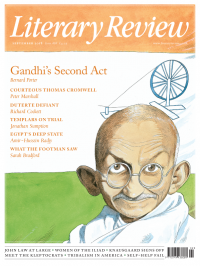Eric Kaufmann
Who Is America?
Political Tribes: Group Instinct and the Fate of Nations
By Amy Chua
Bloomsbury 293pp £20
Anti-Pluralism: The Populist Threat to Liberal Democracy
By William A Galston
Yale University Press 158pp £25
The populist earthquake that began with the 2014 European elections and produced the twin shocks of Brexit and Trump has been followed by a tsunami of books purporting to diagnose the phenomenon. Two welcome and highly readable additions to this genre are Amy Chua’s Political Tribes and William Galston’s Anti-Pluralism. As members of the American intellectual elite, the authors inhabit a community reeling from the blow of Trump’s election, one that is deeply alienated from red-state America. Yet Chua and Galston rise above the reactive simplicity of the anti-Trump ‘resistance’, seeking to understand Trump’s popularity in a clear-eyed way. At first glance, both are establishment liberals. Chua is a high-profile writer and professor at Yale Law School, while Galston is a former adviser to Bill Clinton who worked on the Democratic presidential campaigns of Walter Mondale and Al Gore and is a policy wonk at the left-leaning Brookings Institution. Yet both are centrists rather than card-carrying ideologues, and they are not tone-deaf to the festering grievances that permitted Trump to occupy the most important office in the world. Chua has previously courted controversy for her book Battle Hymn of the Tiger Mother (2011), a paean to strict parenting.
Each writer approaches Trump via a different route. Chua, who has written intelligently on ethnic dynamics in the developing world, begins outside the United States and moves in. She argues that tribalism is a potent force in human society and that elites ignore it at their peril. The

Sign Up to our newsletter
Receive free articles, highlights from the archive, news, details of prizes, and much more.@Lit_Review
Follow Literary Review on Twitter
Twitter Feed
Russia’s recent efforts to destabilise the Baltic states have increased enthusiasm for the EU in these places. With Euroscepticism growing in countries like France and Germany, @owenmatth wonders whether Europe’s salvation will come from its periphery.
Owen Matthews - Sea of Troubles
Owen Matthews: Sea of Troubles - Baltic: The Future of Europe by Oliver Moody
literaryreview.co.uk
Many laptop workers will find Vincenzo Latronico’s PERFECTION sends shivers of uncomfortable recognition down their spine. I wrote about why for @Lit_Review
https://literaryreview.co.uk/hashtag-living
An insightful review by @DanielB89913888 of In Covid’s Wake (Macedo & Lee, @PrincetonUPress).
Paraphrasing: left-leaning authors critique the Covid response using right-wing arguments. A fascinating read.
via @Lit_Review